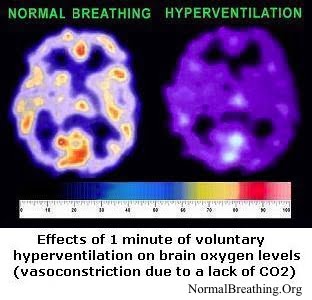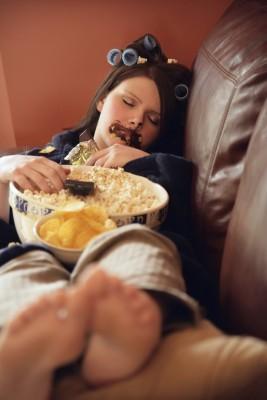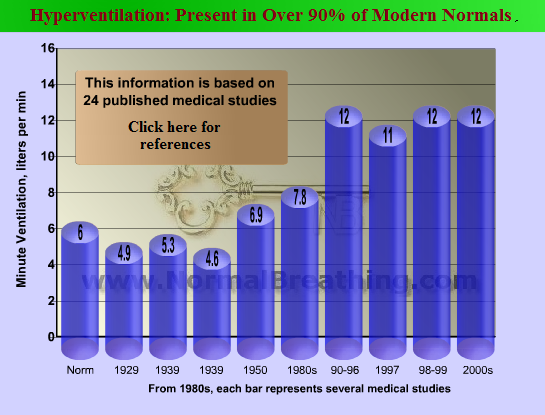- Updated on October 29, 2020
![]() By Dr. Artour Rakhimov, Alternative Health Educator and Author
By Dr. Artour Rakhimov, Alternative Health Educator and Author
- Medically Reviewed by Naziliya Rakhimova, MD
Feeling Tired After Eating Meals or Lunch Means Low Body Oxygen

 Are you tired after eating? As we discussed before, night sleep is generally the most negative factor that increases breathing and reduces body-oxygen levels. The following most damaging factor is eating or meals, especially large ones. You can easily prove that eating dramatically reduces your body-oxygen content using a simple body-oxygen test (see the links below). It is a common effect that body-oxygen test results are reduced by up to 50% or 10 seconds due to ineffective breathing. Consequently, most people feel tired after eating. What are causes and the mechanism?
Are you tired after eating? As we discussed before, night sleep is generally the most negative factor that increases breathing and reduces body-oxygen levels. The following most damaging factor is eating or meals, especially large ones. You can easily prove that eating dramatically reduces your body-oxygen content using a simple body-oxygen test (see the links below). It is a common effect that body-oxygen test results are reduced by up to 50% or 10 seconds due to ineffective breathing. Consequently, most people feel tired after eating. What are causes and the mechanism?
Overeating causes a serious biochemical shock on the whole organism due to factors related to heavy breathing (or breathing more than the medical norm). Heavy breathing reduces CO2 in the blood and that causes constriction of blood vessels (see the image below) and the suppressed Bohr effect (less oxygen is released in tissues). Both effects cause tissue hypoxia and feeling tired after eating.
Feeling exhaustion after eating and even getting drowsy and falling asleep after meals or a good lunch are typical signs of this biochemical shock. This effect of tiredness after eating lunch or other meals is much stronger after eating less nutritious food or junk food and especially overeating.
 We start to generate free radicals in body cells causing oxidative stress or damage to tissues when the body-oxygen levels drop below 20 seconds.
We start to generate free radicals in body cells causing oxidative stress or damage to tissues when the body-oxygen levels drop below 20 seconds.
People with normal breathing parameters (or with more than 40 seconds for the body-oxygen test) do not feel exhaustion after eating and can do light physical exercise, like walking or gardening, with no problems. Furthermore, normal breathing also means fast digestion or about 2 hours to digest a normal or regular meal.
The same meal for a sick individual (e.g., with about 15 seconds for less for the CP or the body oxygen test) usually require about 1-2 hours more to get digested. The sick person would usually need a rest after a meal.
Dealing with fatigue after eating
The answer is simple: people used to have about 40-50 seconds for body O2. With such O2 levels, people crave physical exercise and do not feel tired after eating.
Feeling tired after meals, overbreathing, and obesity
Many modern people, especially obese ones, feel sleepy and tired after eating. This is due to ineffective breathing patterns. The answer to this common problem and the most natural remedy for obesity is to slow down their breathing and achieve more than a certain number (in seconds) for the body-oxygen test.
This number (that guarantees good energy levels and freedom from fatigue after meals) is provided right below here as your bonus content. It is less than 40-50 seconds mentioned above and below on this page.
You need to get 30+ seconds for the DIY body oxygen test all the time.
[/sociallocker]
Any time an overweight person eats complex carbohydrates or fats, his body-oxygen levels and breathing immediately become much worse. Furthermore, hunger for starches and fats indicate a state of stress and low body oxygen with a higher heart rate. That immediately leads to feeling tired after eating.
Natural lifestyle choices before and after breathing retraining
| Lifestyle factor: | Body oxygen < 30 s | Body oxygen > 50 s |
| Energy level | Medium, low, or very low | High |
| Desire to exercise | Not strong, but possible | Craving and joy of exercise |
| Intensive exercise with nose breathing | Hard or impossible | Easy and effortless |
| Typical mind states | Confusion, anxiety, depression | Focus, concentration, clarity |
| Craving for sugar and junk foods | Present | Absent |
| Addictions to smoking, alcohol, and drugs | Possible | Absent |
| Desire to eat raw foods | Weak and rare | Very common and natural |
| Correct posture | Rare and requires efforts | Natural and automatic |
| Sleep | Often of poor quality; > 7 hours | Excellent quality; < 5 hours naturally |
While overbreathing and low body O2 are prime causes of feeling tired and fatigued after meals, a common immediate cause of this problem can be Candida yeast infection or iodine deficiency. In cases of Candida, a person gets fatigue after eating sweet things like table sugar or fruits. There are also symptoms of iodine deficiency and a simple iodine test that you can find on this site (maybe now) or online.
– This page in Spanish: Cansancio después de comer significa nivel de O2 bajo.


